
Nonprofit Fundraising Tools
Strengthen your revenue strategy with expert guidance built for the business of nonprofit fundraising. This collection of video sessions explores the systems, strategies, and shifting technologies that drive sustainable giving—from annual campaigns and major gifts to grants, data-driven donor engagement, and digital fundraising platforms.
Learn from top nonprofit experts and innovators as they share proven and emerging approaches for donor cultivation, persuasive storytelling, impact reporting, and revenue diversification. Whether you’re launching a new fundraising program or optimizing an established one, these lessons offer practical tools and real-world insights you can apply immediately.
Explore how to deepen donor relationships in a tech-enabled world, adapt to changing giving behavior, and build a resilient fundraising engine that supports long-term mission success—regardless of your organization’s size or stage.

how nonprofits set goals that actually move revenue, relationships, and results. They start with the metric many teams avoid because it can be a rude awakening: donor retention. Tony walks through a simple way to calculate it, then connects the number to what leaders feel every day, time and budget pressure. His reminder lands like a CFO truth bomb: “The data doesn’t lie.” If your team assumes things are fine because a few familiar names show up at events, this episode brings you back to reality and gives you a starting point for a better plan.
From there, the conversation turns to relationship depth. The point is not endless list building. It is quality over quantity, supported by segmentation and donor tiers, and backed by a pipeline you can actually manage. Julia frames it in plain business language: your pipeline is not a vague hope, it is a set of lanes that deserve goals, tracking, and steady motion all year, not a December scramble driven by board pressure and gala season.
They also press into revenue diversification, especially when grant and government dollars can shift quickly. Multiple lanes are not just safer, they keep fundraising work more sustainable for the humans doing it. Then they move to data and tools: a robust CRM, mobile access, timely notes after donor meetings, and capacity building funding that can help pay for the systems and training.
Finally, they tie it all together with culture. A culture of philanthropy means everyone owns the donor experience, including customer service, and teams can celebrate other organizations’ wins without losing confidence.
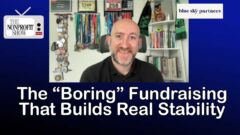
Consistency is not glamorous, but it’s the engine that keeps a nonprofit’s business model running when the calendar flips and the pressure spikes. In this conversation with Matt Glazer, Founder and CEO of Blue Sky Partners (Austin-based, national reach), we talk about building consistent engagement without burning out your team or betting the whole year on a Q4 miracle.
Matt brings a practical operator’s lens: simplify what repeats, template what you can, and stop trying to cram “97 things” into the final stretch. His philosophy is steady, sustainable progress that makes room for reality—staff illness, unexpected disruptions, and capacity limits—so quality doesn’t collapse under urgency. As Matt puts it, “I’m a big believer in doing a little bit of work a lot of the time.”
From there, the conversation gets sharply useful for fundraising and stakeholder communications. Matt challenges the sector’s fixation on “unicorn donors” and reminds us that the so-called boring work—like building a sustaining donor program—creates real stability. He shares a concrete example from his early nonprofit leadership: by repeatedly communicating the value of monthly giving, his organization grew from zero sustainers to $7,000 per month, proving that small gifts, stacked with intention, can fund real infrastructure.
The discussion also tackles a leadership truth many avoid: in many nonprofits, clients and customers are not the same people. Funders may be the “customer” demanding reporting and outcomes, while beneficiaries deserve asset-based language and authentic voice. To bridge those realities, Matt recommends human-centered design tools—journey maps, empathy maps, and personas—to understand how people experience your organization and where alignment between mission, funding, and community needs can become a win for everyone.
Finally, Matt introduces decision trees as a way to improve donor asks and engagement pathways by learning not only what people choose—but why they didn’t choose the other option. That’s how your nonprofit can turn assumptions into strategy and strategy into revenue!
#TheNonprofitShow #NonprofitLeadership #FundraisingStrategy
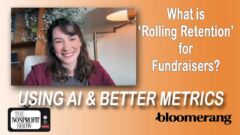
Donor retention is not just a feel good metric it is one of the most powerful levers in the business model of a nonprofit. We sit down with Kirsten Wantland, Principal Industry Strategist at Bloomerang, to explore how organizations can move beyond fear and confusion and actually use retention data to protect revenue and grow lifetime value.
Kirsten begins by explaining her new role at Bloomerang, serving as a bridge between fundraisers in the field and the engineering and product teams. She brings frontline development experience directly into the CRM design process and is now helping shape Penny, Bloomerang’s new AI strategic fundraising partner. Penny will guide staff on which segments to work, what messages to send, and where to focus limited time so small teams can function like much larger shops.
From there, the conversation turns to why traditional retention tracking leaves so many nonprofits stuck. Measuring retention once a year on a calendar basis keeps leaders in a reactive posture, staring at last year’s results instead of managing today’s risks. Kirsten introduces the concept of ‘rolling retention’ a metric that constantly surfaces donors who are about to lapse based on their actual giving patterns. That simple shift creates a proactive pipeline of people to thank, call, invite, and re-engage before they disappear.
At the heart of her approach is a deeper philosophy about donor relationships. As Kirsten puts it, “Ultimately, our donors want a place to belong. They want to be part of a mission. They want to be part of a solution.” Rolling retention, better benchmarking, and even AI tools like Penny are there to serve that goal helping fundraisers step away from purely transactional requests and toward thoughtful, ongoing engagement.
Kirsten closes by urging organizations to start somewhere, choose a few key metrics, track them consistently, test new strategies each quarter, and adjust when the data shows no movement. In a crowded landscape of 1.8 million nonprofits, the ones who treat retention as a core business function not just an afterthought will be the ones that build resilient revenue and loyal communities.
#TheNonprofitShow #DonorRetention #NonprofitBusinessStrategy
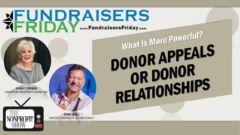
In this thoughtful Fundraisers Friday conversation, cohosts Julia C. Patrick and Tony Beall take viewers inside one of the most persistent tensions in fundraising: the distinction between donor appeals and donor relationships. Using real experiences, honest stories, and decades of shared sector knowledge, they walk through why these two ideas are often treated as opposites—when in reality, they function best in tandem.
Their convo opens with warmth and camaraderie, quickly shifting into a substantive examination of how appeals work. Tony offers a clear definition, noting that appeals are intentional, seasonal communications designed to spur timely action. Year-end campaigns, back-to-school initiatives, and Giving Tuesday messages all fall squarely into this category. They carry a sense of immediacy, a call for participation “in the here and the now.”
But as Julia points out, the urgency of an appeal can mask deeper strategy concerns. Organizations sometimes over-rely on “spray-and-pray” messaging, sending thousands of identical asks without considering whether the recipient is already deeply invested, newly aware, or somewhere in between.
From here, the cohosts explore the more nuanced terrain of donor relationships—a slower, more personal rhythm grounded in trust, communication, alignment of values, and long-term stewardship. As Tony states in one of the episode’s most resonant lines, “Building the relationships, maintaining the engagement… will ultimately result in a larger gift.” It’s a reminder that fundraising is seldom about instant gratification; it is about cultivating connection over time.
The two also address the emotional dynamics of how appeals are perceived. Tony shares a striking moment when he received a letter with the single handwritten word “Help!”—a gesture intended to convey urgency but which instead signaled distress. Julia and Tony use this example to emphasize the responsibility fundraisers have when they frame need, motivation, and tone. They move into donor segmentation, donor tiers, and the organizational realities faced by nonprofits of every size—from kitchen-table startups to high-rise institutions.
Throughout the conversation, the cohosts reinforce the idea that appeals and relationships should not be competing strategies. Instead, they are complementary tools within a bigger architecture—one that acknowledges the emotional, operational, and strategic layers that shape philanthropic investment.
#TheNonprofitShow #FundraisersFriday #NonprofitLeadership
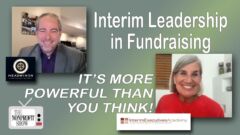
Interim leadership is no longer just a stopgap in the executive director’s seat—it’s becoming a strategic engine for sustainable fundraising. Joan Brown, Chief Operating Officer at Interim Executives Academy, and David M. Nicole, CFRE, founder of Headwinds Consulting, share why interim development leadership may be one of the most underused tools in the nonprofit sector.
Together, Joan and David contrast short-term revenue fantasies with the realistic, process-based nature of fundraising. They call out unrealistic expectations—boards and CEOs who imagine the interim will arrive with a magic button and instant major gifts—and instead emphasize assessments, strategy teams, and shared ownership across staff, board, and executive leadership.
Joan opens by reframing the “interim world” as an intentional, structured response to leadership transitions, not just a temporary patch. Interims, she explains, aren’t there to keep a chair warm; they’re there to guide organizations through CEO, COO, and chief development officer transitions with clarity, planning, and structure. With turnover rising and leadership expectations evolving, the data point is clear: every leader leaves, so organizations need a plan that goes beyond wishful thinking.
David brings numbers and nuance from his six interim roles—split between CEO/executive director and development director positions. He describes a model where interim development directors are explicitly hired with clear objectives, defined timelines (often 12–18 months), and a mandate to build systems, not personal empires. His philosophy is summed up in a powerful line:
“My success is not necessarily what I accomplish while I'm there. My success is measured by what the organization accomplishes after I leave.”
The conversation also explores how donors and funders respond when organizations are transparent about using interim leaders. Surprisingly, many donors appreciate the foresight, especially when the message shifts from “we’re in crisis” to “we’re investing in long-term stability.” Community funders are beginning to require succession plans and even encourage interim solutions as a sign of sound governance.
You’ll agree, interim development leadership looks less like a temporary fix and more like a strategic on-ramp to sustainable fundraising, stronger boards, and healthier organizations!!
#TheNonprofitShow #InterimLeadership #NonprofitFundraising
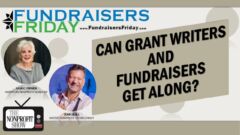
Grant writers and fundraisers share the same mission, but often work in different corners of the building—and sometimes entirely different worlds. In this Fundraisers Friday convo, cohosts Julia C. Patrick and Tony Beall peel back the curtain on how these two roles can move from quiet coexistence to true collaboration.
Julia opens with gratitude—for long standing sponsors who have never tried to steer the show’s content, and for a sector that now offers far more professional development than when many fundraisers began. She reflects on her own journey from community fundraising to co-authoring The Architecture of Fundraising with Tony, noting how accessible tools and training could have transformed her early efforts. “I could have raised so much more money for my community if I had been educated,” Julia admits, inviting viewers to keep learning alongside them.
Tony adds his perspective from years in executive leadership, where he saw the strain between event heavy fundraising teams and grant writers tucked away in quiet corners—or now, working remotely. He reminds us that grant writing is both demanding and discouraging work, with many applications never funded despite excellent cases. “We have to find ways to continually celebrate the work that’s being done by grant writers, whether the grant is being approved or not,” Tony says, naming the emotional labor behind every proposal.
Together, Julia and Tony explore how shared language, aligned metrics, and thoughtful use of technology can connect these roles. They talk about separate goals for grants, events, and individual giving, all tied together through dashboards, regular communication, and clear expectations. They even walk through ethical ways to use board and community relationships to support grant applications—without crossing any lines.
In the end, this learning session becomes a gratitude filled call to action: respect each lane, build consistent communication, celebrate the wins, and ensure leadership is championing the relationship between grant writers and fundraisers. When those pieces come together, fund development becomes a unified team effort instead of a quiet, siloed grind.
#TheNonprofitShow #FundraisersFriday #NonprofitFundraising
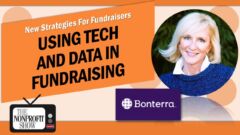
Tech, data, and generosity are not abstract buzzwords—they’re concrete levers that can stabilize funding, expand impact, and re-energize exhausted fundraisers. Chief Fundraising Officer Kimberly O’Donnell of Bonterra joins us to map out how recurring giving, trust-based philanthropy, and AI-powered tools can move the entire sector from scarcity thinking into a new “generosity generation.”
Kimberly starts by reframing recurring giving as non-negotiable infrastructure, not a nice-to-have tactic. As she puts it, “Recurring giving is essential for nonprofit sustainability. Just no, hard stop there.” Bonterra’s own research shows why: in its Meet the Moment report, 58% of federally funded nonprofits report financial instability this year. In that environment, a predictable base of sustainers—monthly and annual—can keep programs moving even as federal funds, disaster response dollars, and one-time grants fluctuate.
She shares a compelling case study: a Bonterra client that introduced three choices on its donation page—one-time, monthly, and annual. By normalizing both monthly and annual recurring options, that organization grew from zero sustainers to more than 65,000, proving that donors will enthusiastically choose ongoing support when invited clearly and confidently.
Kimberly also dismantles the common boardroom fear that sustainers will cannibalize major gifts. In her view, that’s simply a myth. Monthly donors should be seen as high-value relationship partners whose lifetime contributions, planned gifts, and sponsorship potential can grow over time. The real problem isn’t “small monthly donors”; it’s organizations deciding on behalf of donors when and how they will give.
From there, the conversation widens. Kimberly explains how Bonterra’s vantage point—serving nonprofits, community foundations, CSR programs, and public agencies across the social good ecosystem—reveals sector-wide patterns in real time. Trust-based philanthropy, she notes, hasn’t disappeared; it’s evolving. Funders are becoming more intentional, concentrating resources on core pillars while streamlining reporting and using their networks to introduce nonprofits to new corporate and philanthropic partners.
Then comes the big vision: Bonterra’s “30 by 33” initiative to move charitable giving in the U.S. from a stagnant 2.5% of GDP to 3% by 2033. Achieving that shift, Kimberly argues, will require data, AI, and human connection working together—what Bonterra calls the generosity generation.
AI, in particular, is already reshaping daily fundraising practice. Bonterra has been using agentic AI since 2016–2017, and its new tools are built with a “human in the loop” philosophy so fundraisers can test, refine, and own their messages.
Kimberly’s closing message is both empathetic and urgent: acknowledging nonprofit exhaustion yet pushing leaders to resist retreat: this is not a moment to slow down—it’s a moment to experiment, ask bolder questions, and lean on tools that make the work more sustainable.
#TheNonprofitShow #NonprofitFundraising #BonterraTech
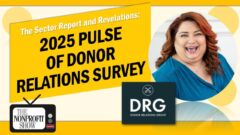
Donor love is measurable, and in this lively discussion, guest Lynne Wester, Principal and Founder of Donor Relations Group, brings the receipts. Drawing on data from her seventh global donor relations survey, conducted every two years since 2013 with more than 1,000 participants, Lynne shows us why retention, not the next big campaign, is where the real money is.
Her core message is blunt and refreshing: we obsess over the ask even though it represents a tiny slice of our contact with supporters. As Lynne puts it, “Retention is the secret sauce of fundraising.” Most organizations still pour staff time and budget into events and tactics with weak ROI, while reporting that they are only able to share impact with less than 20 percent of their donors. That gap is not just operational; it is a revenue problem.
The survey findings expose a pattern. Many donor relations teams sit under a mountain of tasks but lack a strategic plan, making them vulnerable to “seagulling” requests that fly in, drop work, and disappear. At the same time, donor relations professionals tend to stay in their roles four to nine years, while frontline fundraisers churn in about 16 months. The people who understand donor experience best often have the quietest internal voice, and Lynne’s work is about giving them data to change that.
She shares how longitudinal data helped the sector mostly abandon donor honor rolls: today, over 80 percent of nonprofits no longer produce donor lists that were costly and not meaningful. The survey is now pushing similar change around giving societies, the split between receipts and acknowledgements, and the use of AI. Lynne is candidly concerned that many organizations use AI tools without organizational policies, even as donor databases at major institutions have been compromised. For her, donor confidentiality and the Donor Bill of Rights demand guardrails before automation.
Perhaps the most poignant remark is Lynne’s insistence that gratitude and listening are not “extras” but performance drivers. Retaining a donor is five to seven times less expensive than acquiring a new one, and organizations that cared for donors as human beings during crises like the 2008 downturn and COVID raised twice as much as those that just kept asking. She argues that if a donor is not “worth a stamp,” the organization does not deserve the gift.
Lynne leaves viewers with a challenge wrapped in encouragement: use data to question tradition, ask donors for their opinions, and treat stewardship as strategic fund management, not a courtesy. When you align technology, policies, and human connection around gratitude and impact, you are not just being nice—you are building a durable, scalable fundraising engine.
#TheNonprofitShow #DonorRelations #FundraisingData
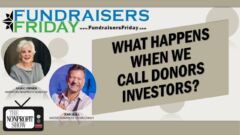
What if the people we call donors are actually investors? And what if this subtle shift reshapes expectations, power, professionalism, and even the identity of philanthropy itself? Julia C. Patrick and Tony Beall challenge one of the nonprofit sector’s most deeply rooted labels.
Julia opens the conversation by admitting she’s ready to change her own vocabulary, saying, “I’m going to really work hard to say investor, because I think you’re right—this is the way we need to go.” Her candor sets an energetic tone for a conversation that questions long-held nonprofit norms while encouraging fundraisers to rethink the relationship they build with contributors.
Tony expands on how much the terminology already shapes his practice. “It’s pretty much standard for me now to speak of donors as investors,” he explains, noting that while the marketplace may not fully be prepared for the switch, fundraisers can begin reframing relationships in ways that strengthen professionalism, transparency, and long-term engagement.
The conversation provocatively asks whether “donor” — rooted in the Latin donare, meaning to give — unintentionally implies release, relinquishment, or even detachment. Meanwhile, “investor,” drawn from investire, meaning to clothe or furnish power, places the contributor inside the organization’s journey, not on the sidelines.
From this vocabulary shift springs a lively exploration of expectations. A donor may hope the gift “does good,” while an investor wants measurable progress, long-term capacity building, and consistent communication tied to real results. That distinction pushes nonprofits toward better data, better systems, and better reporting.
Julia and Tony also discuss how this reframing could meaningfully influence recruitment and retention in the sector. Elevating the profession with language rooted in strategy and expectation — not charity alone — may attract more skilled talent while giving current fundraisers a clearer sense of the complex, meaningful work they perform.
They later explore generational dynamics. Older supporters may lean toward benevolence. Younger supporters are far more metrics-driven, tech-oriented, and impact-focused. For next-gen philanthropy, “investor” may simply feel more accurate.
The informative convo closes with a practical comparison using a $5,000 gift to a food bank. A donor experiences satisfaction and goodwill. An investor expects data: pounds of food purchased, households served, meals distributed. The contrast illuminates how terminology drives operational behavior.
By the end, the case for shifting language becomes both philosophical and functional. It’s a lens that prompts nonprofits to strengthen systems, build trust, and engage contributors more meaningfully — all while honoring the emotional roots of giving.
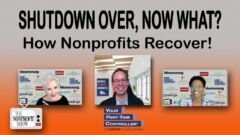
Federal shutdown over! Systems rebooting! Nonprofits on the clock! In this urgent episode, we bring back Derick Dreher, Department Leader, Government Funding at Your Part-Time Controller (YPTC)—just hours after the government reopens from the longest shutdown in U.S. history.
Derick starts with what happened in Washington: failed Senate votes, a last-minute continuing resolution, and a deal that funds government operations into January while restoring budgets for agencies like USDA and programs such as SNAP. But this is not just a civics lesson; it’s a compliance wake-up call for every nonprofit with federal awards.
Even though agencies were closed and portals were offline, he reminds viewers that obligations never went away. As Derick puts it, “It’s a challenge, but you still have to do it.” Reports due during the shutdown are still due. If a federal portal was off, organizations should have emailed, mailed certified copies, and documented every step. That paper trail may be the difference between a simple explanation and a “you’re in breach” notice now that systems are back up.
Derick explains that rules are shifting at the same time pressure is rising. An August executive order on federal grantmaking is reshaping Uniform Guidance and, in some cases, contradicting existing regulations. Nonprofits cannot simply move programs from October to November or rework budgets on their own. Any change—timelines, program design, vendors—requires permission.
The human side of this story is just as urgent. Federal employees returning from 43 days of furlough are staring at thousands of unread messages, while agencies are already dealing with staffing shortages. Automated payments and notices may resume quickly, but nuanced approvals, extensions, and clarifications will take time. That means nonprofits must expect delays while still operating at peak year-end demand and navigating food insecurity, SNAP disruption, and stretched donors.
Derick calls on leaders to treat this as a mini audit moment: review every award, update budgets and reports, clarify what did and didn’t happen during the shutdown, and then proactively request extensions and changes. “Federal awards are complicated beasts that have a lot of details and a lot of moving parts, and there’s no reason to be afraid of accepting them,” he says—if leaders build strong internal controls for timesheets, receipts, and documentation.
Above all, think of this as a reframe of the relationship with government funders: not as begging with an outstretched hand, but as a handshake partnership where authenticity, preparation, and transparency show you are leading with excellence. Get organized now, communicate wisely, and you can turn this chaotic shutdown into a proving ground for your nonprofit’s strength and mission focus.
#TheNonprofitShow #NonprofitFinance #GovernmentGrants
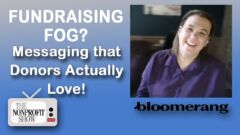
Fundraising can feel like walking through mist—messages blur, instincts wobble, and urgency crowds out intention. In this energizing conversation, we welcome returning favorite Micah James (team lead and coach at Bloomerang—and a bride-to-be!) to name the haze and show practical ways through it. Micah calls today’s moment “muddy and foggy” because donors face nonstop alerts, shifting giving channels, and rising skepticism about how funds are used. Organizations feel it too: higher costs, greater need, and inboxes stuffed with appeals that all sound the same.
So what cuts through? First, stop centering money and recenter mission. As Micah says, “We don’t want to give to budgets…we want to give to people, to mission, and to impact.” Translate dollars into outcomes. “There’s nothing wrong with saying we’re raising $3,000 because it will feed 300 families”—pair the cost with the change. Then make it personal. Tell one vivid story (Stacy, Jim, or Larry), not vague totals. Shift language so the donor becomes the hero; use “you” as often as “we.” That mental switch alone sharpens your message and steadies your strategy.
Micah urges radical transparency to build trust. Be clear about what it takes to serve and honest when you’re not top-of-mind in the community. Share the real work and the real budget picture without panic language. Invite support in many forms—gifts, volunteer hours, or simple acts of advocacy—and keep communicating the difference each supporter makes.
A big unlock is specificity. Use your database tools to reference the donor’s last gift and show what it accomplished. Celebrate recurring givers and ask for modest step-ups (from $10 to $15, from $47 to $60). Those small upgrades flatten chaotic cash-flow lines and reduce the pressure that pushes teams into constant alarm. Micah reminds us that the often-forgotten “middle” donors—already engaged, steady in capacity—can become the backbone of predictable revenue when you know them well and speak to what they care about.
Bottom line: name the fog, then choose clarity. Tell one true story. Make the donor the protagonist. Map dollars to outcomes. Share the journey openly. When you do, the sun breaks through—and sustainable generosity follows.
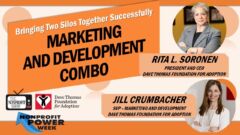
The Dave Thomas Foundation for Adoption shows exactly how today’s nonprofits can accelerate mission and amplify revenue by putting marketing and development on the same team! CEO & President Rita L. Soronen and SVP of Marketing & Development Jill Crumbacher explain how an approach that started 11 years ago matured into an integrated structure with shared goals, clear ownership, and board alignment. As Rita puts it, “there’s just this intuitive sense…that one feeds the other,” adding that the shift “became very much an organic, ongoing conversation based on results.”
Jill brings for-profit rigor to the model: a VP of Marketing and a VP of Development co-lead paired “mini teams” for every fundraising channel, tracked in Asana with crystal-clear metrics. “Building a brand builds fundraising and building fundraising builds a brand. It just does,” Jill says. She adds, “For every fundraising team, we have a marketing team that supports the fundraising team”—a simple but powerful mechanism that reduces friction, speeds execution, and raises standards across content, design, and segmentation.
Rita details how leadership benefits from unified messaging: presentation materials, program context, and donor narratives are synthesized by one group that also collaborates tightly with program staff. She emphasizes stewardship and brand guardianship: “we’re not just protecting the brand of children in foster care, we have Dave Thomas in our name… We’re protecting that brand as well,” including the Foundation’s decades-long partnership with Wendy’s. The conversation also takes on today’s polarized climate. “We’re putting resources into the effort of how do we bring polarized conversations back together?” Rita notes, reinforcing the Foundation’s focus on solutions that broaden support without losing mission clarity.
Talent development is intentional. Jill shares how their marketers attend the Lilly Family School of Philanthropy to learn fundraising dynamics, while fundraisers learn marketing language and channels—so both “come out of the same gate.” The approach scales: the department grew from a handful of staff to 25, roughly split between development and marketing, with half of marketing embedded on fundraising squads and half focused on awareness, brand, and sector thought leadership.
The result is a disciplined, collaborative culture that moves faster, communicates smarter, and raises more—while advancing permanency for children in foster care.
#TheNonprofitShow #Adoption #NonprofitLeadership
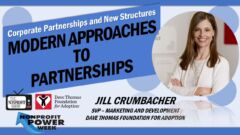
The Dave Thomas Foundation for Adoption doesn’t treat partnerships as a side project—they’re the operating system. During this National Adoption Month and in this Nonprofit Power Week kickoff, Senior VP Jill Crumbacher shares how the Foundation builds relationships that move from a good idea to real results. Step one: align the people doing the work. “Our marketing and our development practice is under one department that I lead,” Jill explains. That single team design means awareness and revenue aren’t competing—they’re collaborating—so a PSA, a billboard, a direct-mail test, or an influencer post can ladder up to the same mission outcome.
Jill dismantles the common myth that Wendy’s alone funds the mission. Wendy’s is a long-standing, values-matched partner, but the need—kids and teens waiting for family in the U.S. and Canada—calls for many hands. That’s why DTFA manages a wide mix of partners each year: micro-influencers and media outlets, cause-aligned brands, and fundraising collaborators. To keep everything clear and friendly, they start with the right agreement for the moment—an approachable MOU for brand exchanges and content support; a fuller contract when dollars or large placements are involved. The paperwork isn’t red tape—it’s a map. Who does what, by when, with what approvals. Everyone can move faster because expectations are written down.
Media is changing, and the Foundation adapts. Donated placements are still vital (think PSAs across billboards, airports, radio, and connected TV). But there’s also a growing middle lane Jill calls “low bono”—discounted inventory that isn’t free but is far below market. The team buys when the data says it’s smart, especially in digital, and pairs that with donated reach for scale.
Brand care is a shared responsibility. The Foundation reviews language and usage to protect its name and the Wendy’s connection. If something flares online, they pick up the phone so partners aren’t blindsided. That builds trust, and trust keeps doors open. Multi-year deals? They’re great when they make sense, but Jill’s team prefers to earn renewal through value rather than lock people in. The relationship stays fresh because both sides want to come back.
Maybe the most refreshing part is Jill’s take on celebrity. The organization has tested it; the results weren’t lasting. The real wins come from people and brands who show up because they truly care. As Jill puts it, “You go further with the ones that are organic… when you’re all in it about the mission.” Those partners bring energy, introduce new allies, and help the message travel farther.
If you’re rethinking how your organization shows up with partners—how you set expectations, share brand space, blend donated and paid reach, and keep everyone rowing in the same direction—this conversation is a ready-to-use roadmap for doing it well, and doing it together.
#TheNonprofitShow #AdoptionMatters #NonprofitPartnerships
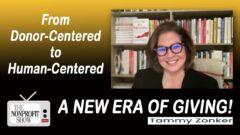
When fundraising meets humanity, transformation follows—and few express that better than Tammy Zonker, founder of Fundraising Transformed and author of Calling All Heroes. In this powerful episode, host Julia C. Patrick engages Tammy in a deep conversation about reimagining philanthropy through what she calls a human-centered mindset—a new evolution beyond donor- or community-centric models.
Tammy explains, “The human-centered mindset is fundamentally about recognizing that everyone involved in the philanthropic process brings unique value—lived experience, expertise, and contribution—all of which deserve to be respected and valued.” That respect, she notes, comes alive through five principles: listening, empathy, belonging, shared values, and authentic partnership. Each principle is deceptively simple but radically powerful in a world that’s become more divided and transactional.
After 17 years leading Fundraising Transformed, Tammy has seen the shift from transactional giving toward connection-based relationships that sustain missions, not just budgets. Yet, she reminds us that even well-intentioned donor-centered models can reinforce inequity when organizations let large gifts steer mission or silence truth. “We never had the courage to course-correct because we feared losing the funding,” she says candidly—a line that will resonate with fundraisers everywhere.
Her solution? Blend the best of both approaches. Donor-centered fundraising taught gratitude and impact reporting; community-centered fundraising elevated justice and inclusion. A human-centered model marries both, removing ego, flattening hierarchy, and restoring empathy across every role—donor, volunteer, staff, and participant.
Tammy ties this philosophy to the real data crisis in philanthropy: donor retention at just 43% overall and a mere 19% for first-time givers. With fewer households donating each year, she warns that philanthropy risks becoming an elite sport. Instead, she advocates re-elevating small monthly donors, volunteers, and advocates whose collective action drives real change.
The episode ends on a liberating message for nonprofit professionals: progress over perfection. Perfection, Tammy insists, “is overrated.” Real leadership requires risk, humility, and innovation—and that means acting, failing, learning, and trying again.
In a time when empathy often feels endangered, Calling All Heroes reminds us that every fundraiser, donor, and community member has a heroic role to play. Humanity, it seems, is the most sustainable fundraising strategy of all.
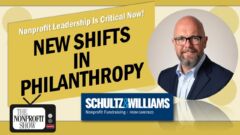
Craig Shelley, CEO of Schultz & Williams, joins Show host Julia Patrick, as they examine how philanthropy and nonprofit leadership are being reshaped under persistent uncertainty. Craig frames the moment succinctly: skepticism toward institutions is rising, which means nonprofits must state their values plainly and show exactly how funds power outcomes. The rubric he uses —“culture, brand, growth,” with culture first—becomes a practical lens leaders can apply immediately.
A central thread is fear—of economic signals, of language missteps, of technology’s speed. Craig notes that newer terms and jargon often widen the gap between sector insiders and the public. The remedy, he argues, is precision in communication and integrity in positioning. Julia observes a leadership pivot she’s hearing across the sector: “I’ve shifted my focus from task management to almost cheerleader,” which reframes modern leadership as energizing teams, not merely allocating tasks.
Remote work adds complexity: video meetings enable contact but thin relationships. Craig cautions that virtual convenience can erode the depth required for durable trust with colleagues and donors. He urges fundraisers—especially early-career professionals—to prioritize in-person relationship building. Otherwise, if their engagement stays purely digital, they compete directly with automated outreach. AI, in his telling, is already table stakes for efficiency—wealth screening, signal-based prospecting, and automated acknowledgments—but not a substitute for human rapport.
The conversation widens to concentric circles of stakeholders: start with staff, then the board, donors, and constituents. Invest in people first—reduce friction, understand motivations, build clarity. Curiosity is the catalyst. Craig’s own practice—asking about lives beyond job titles—models how depth is built. Julia adds a counterweight on “authentic leadership,” wryly noting that unfiltered authenticity can unsettle teams; leaders must project steadiness even while processing strain.
What emerges is a modern leadership compact: clarity about values, consistent communication, judicious use of technology, and intentional relationship work—especially in person. The sector’s generosity hasn’t waned; the environment around it has shifted. Navigating that shift means centering people and partnerships, then aligning tools to support, not replace, human connection.
